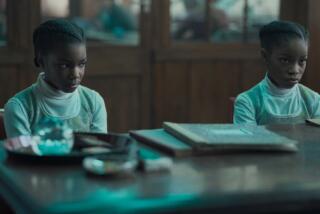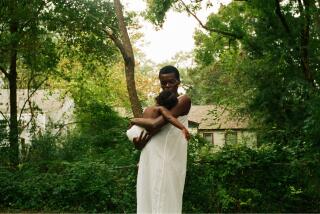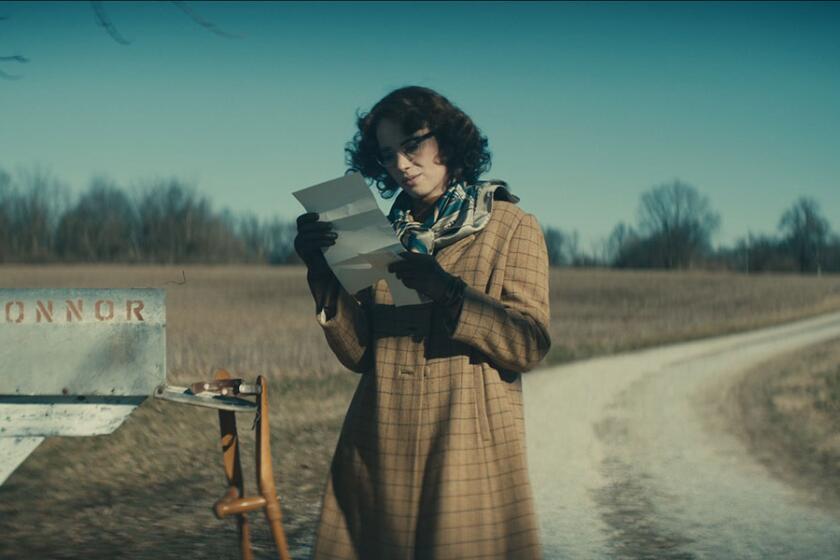Movies : Meek No More : ‘Designing Women’ alum Jean Smart sheds her mild persona for role of bitter mother in ‘Guinevere.’
Jean Smart doesn’t appear to have a mean bone in her body. After all, she’s best known for her role as the sweeter-than-sweet Charlene Frazier on the CBS comedy series, “Designing Women.” Other TV roles have played off her mild-mannered persona and wholesome good looks.
Perhaps it’s that image which makes her performance in the new romantic drama “Guinevere” so strong and startling. Written and directed by Audrey Wells (“The Truth About Cats and Dogs”), the Miramax release casts Smart as Donna Sloan, the embittered, controlling, sharp-tongued mother of Harper (Sarah Polley), a young woman who decides to move in with a much older, bohemian photographer (Stephen Rea) instead of following the family tradition by attending Harvard Law School.
Smart steals every scene she’s in, including two family dinner sequences and a particularly nasty confrontation between Rea and Polley that she gets involved in. The film opens Friday.
The 40-year-old actress has appeared on the New York and Los Angeles stage and in such feature films as “The Odd Couple II,” “Edie & Pen,” “The Brady Bunch Movie,” “Homeward Bound: The Incredible Journey” and “Mistress.” Her numerous TV movies include “The Yearling,” “A Stranger in Town,” “Overkill: The Aileen Wuornos Story” and “A Seduction in Travis County.”
Smart recently discussed her transformation into the brittle Donna, as well as upcoming projects.
Question: What made your character so nasty in “Guinevere”?
Answer: She is not a happy person. [Her oldest daughter] had stolen her life, and she wasn’t ready to have life pass her by yet. She became very bitter and angry, and fortunately or unfortunately for those around her, she has the wit and the humor and the intelligence to use her anger in an especially effective way.
I know they had offered the role to some huge name actresses before me, before they turned to me. Fine, I’ll take your castoffs! Thank you. That’s fine and dandy!
Q: Was it difficult, though, to inhabit her skin?
A: Audrey did as much rehearsing as she could. She was great. She knew that the dinner table scenes with the family were going to be very important and difficult because the relationships are so fragile and different. So she had us all to her house, and we improvised rehearsals. It was very helpful. Normally, I’m not a big fan of improvisation, but it really helped and some interesting stuff came out.
One day, she had us just pick anybody at the table and tell them something we wanted to tell them, whether it was a cry for help or something insulting or something funny. It got very intense and was very interesting.
Q: Your best scene occurs when you confront Stephen Rea and Sarah Polley in his apartment.
A: That was fun.
Q: Did Wells give you free rein with that scene?
A: She did, but she had written it so well. You read that scene and you go, “That makes the part worthwhile.” We both saw it the same way, pretty much. She did such an incredible job for a first-time director, and obviously, that she had written it was a great advantage for all of us because she could hear it in her head. She loved actors, and she was able, in a real gentle way, if you got stuck on something, she would come over quietly give you a few words or a little suggestion that would hit the nail on the head.
Sarah and Stephen are both so amazing to work with because they are actors whose characters inhabit their whole bodies. Stephen has the most delightful sense of humor. They made the scene so easy. Their reactions were so strong and specific and yet very small.
[My character] has picked out the right dress she wants to wear. She knows exactly what’s she doing. When you decimate someone with a smile, it is somehow more vicious. If she would have come in and screamed and hollered and yelled, which is what I would have done, it is far less effective. I think we all know that from growing up, if we had one parent who was quiet and one who was a screamer, the screamer is far less effective. She doesn’t just destroy [Stephen], she takes her daughter down too. It’s terribly sad.
People at the end of the film hopefully will have some, if not sympathy, empathy or some understanding of her. Hopefully, there is some mystery to her, and they don’t know exactly what is going on with her and what she is thinking. I think there is a sense of desperation and unhappiness.
Q: As wonderful as this role is, do you find that there are better parts for actresses in TV movies?
A: I think that goes without saying. I think especially if TV audiences are familiar with you. TV movies also reach a much wider audience than a feature film will, unless it is a huge blockbuster. In a feature, there is usually the leading lady who used to be 35 and now is 20, and there are about 20 men’s roles and maybe she has a friend. If she doesn’t have a friend, she might have a mother. I’m not totally ready to always be the mother of the bride.
Q: Do you have a TV series in development?
A: I’ve got a series idea that a friend of mine is writing that I’m trying to decide [whether] to jump on board or not. It is a comedy. I’ve always turned down the one-hour dramas because the work schedule is so horrendous. But now I am getting to the point that if it was a big, ensemble show, I think it would be really fun to do.
I also have two other movies coming out. The one is a Paramount movie with Chevy Chase called “Snow Day.” That was fun. The other is called “Tiara Tango” with Robert Wagner. He plays my boyfriend, this out-of-work lounge singer, and I’m an ex-Texas beauty queen. We go on this sort of road trip in his Winnebago that has tiger-striped upholstery and red chili-pepper Christmas lights. It’s going to the Austin Film Festival in a couple of weeks.
More to Read
Only good movies
Get the Indie Focus newsletter, Mark Olsen's weekly guide to the world of cinema.
You may occasionally receive promotional content from the Los Angeles Times.







